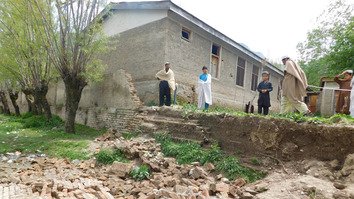PESHAWAR -- The United Nations Development Programme (UNDP) and Khyber Pakhtunkhwa (KP) authorities recently inked a memorandum of understanding (MoU) to promote girls' education in Kurram and Orakzai. The move has drawn praise from teachers and parents.
Funded by Global Affairs Canada, the project will be jointly implemented by the UNDP, the UN Children's Fund (UNICEF) and the KP Elementary and Secondary Education Department, according to a UNDP statement on February 20.
The three-year effort will provide support to the education department, community and students and improve access to education for about 14,000 students, with a focus on adolescent girls, the UNDP said.
The project will involve the rehabilitation of 100 damaged schools and provide school supplies and furniture.
More than 300 teachers will be trained on "student-centred and gender-responsive teaching practices", the UNDP added. The programme will form and train about 155 parent-teacher associations and mother groups to promote and monitor girls' access to education.
Health and hygiene awareness sessions are being planned for adolescent schoolgirls in 155 schools of Kurram and Orakzai districts.
"Education is the first step to breaking the poverty cycle," Ignacio Artaza, resident representative of UNDP Pakistan, said during a Peshawar ceremony marking the signing of the memorandum, according to a UNDP statement. "The future of the merged districts is dependent on harnessing the potential of its young [generation] through formal and informal education."
Improved security
"We appreciate all efforts and initiatives taken by authorities to promote education in tribal districts where girls' access to education saw many difficulties and setbacks due to ... law-and-order conditions," said Said Zahid Hussain Qazi, president of the Kurram Valley Teachers Association.
"The unsatisfactory security situation and growing extremism forced many parents to confine schoolgirls to their homes in militancy-affected areas of Kurram," he said.
"At the time, the looming threat of militants who destroyed many educational institutions in central Kurram instilled an indelible sense of insecurity and fear among parents and students," Qazi said.
"The improved security situation after the elimination of militancy and the entry of foreign donors in collaboration with the KP Education Department... are a good omen that was needed to improve education, especially that of girls, in the Kurram and Orakzai tribal districts," he added.
"Uncertainty and fright prevented parents from sending their children to schools during the period of extremism. Now, parents are optimistic of new development after the merger [in 2018 of the former Federally Administered Tribal Areas and KP] and eyeing better prospects for their children, especially girls," said Qazi.
"The situation in Kurram Agency deteriorated after 2007, while the propaganda against education, especially of girls, during militancy put parents under duress and affected the education of girls in these areas," said Azmat Alizai, a father of two who resides in Parachinar, Khurram District.
"Schools situated in areas of upper Kurram, including Dogar, that are inhabited by the Ali Sherzai and Musazai tribes and in the villages of Boghaki, Piwar, Shalozan and Khaiwas were damaged during the period of militancy," he said.
Schools in central Kurram that had the highest literacy rate among girls incurred major losses during that period, he noted.
"The families residing in these areas stopped the education of their children because of unfavourable conditions and because of the dilapidated infrastructure of schools in the aftermath of militancy," Alizai said.
"Judicious spending to promote education will curtail the chances that youngsters are misguided and exploited by the forces of extremism," he said.
Defeating fear
"Various schools of upper Orakzai, including in the Mamozai and Mulla Kheil areas, were damaged during militancy, which led to chaos and a disruption of educational activities," said Haji Feroz Khan, a teacher at Government Higher Secondary School Mishti Bazar and president of the Teachers Association Orakzai.
"Fear crept into the hearts of parents, and children stopped attending schools because of the law-and-order situation and the animosity of extremists toward education," he said.
"The restoration of peace and the commencement of public welfare projects in the tribal belt after [the FATA-KP] merger are a beacon of hope and ... of a better future for tribal children," Khan said.

![UN and Pakistani officials February 20 in Peshawar take part in a signing ceremony for a memorandum of understanding aimed at promoting girls' education in Orakzai and Kurram districts. [UNDP]](/cnmi_pf/images/2020/04/01/23301-undp_2-585_329.jpg)






